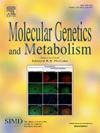Missense mutations in MMACHC protein from cblC disease affect its conformational stability and vitamin B12-binding activity: The example of R161Q mutation
IF 3.5
2区 生物学
Q2 ENDOCRINOLOGY & METABOLISM
引用次数: 0
Abstract
MMACHC protein plays a crucial role in the metabolism of vitamin B12 (cobalamin, Cbl) by catalyzing its conversion into the active forms adenosylcobalamin (AdoCbl) and methylcobalamin (MeCbl), which serve as essential cofactors in key cellular reactions. Mutations in the gene encoding MMACHC lead to the rare metabolic disorder known as methylmalonic aciduria and homocystinuria, cblC type. This condition predominantly affects children and is characterized by cardiovascular dysfunction, intellectual disability, and a severe form of maculopathy. The most common missense mutation, R161Q, impairs enzymatic activity despite not being directly involved in cobalamin binding. Here, using a comprehensive set of biophysical techniques, we demonstrate that this pathogenic variant compromises MMACHC structural stability, alters the thermal unfolding cooperativity and pathway, as well as the populations of conformational intermediates. Moreover, we show that the R161Q mutation decreases AdoCbl binding affinity and impairs the protein's ability to form homodimers, which are supposed to have a functional role. A partial recovery in protein activity upon treatment with betaine, an osmolyte known for its stabilizing effect on proteins, was observed. This suggests a direct correlation between the energetics of MMACHC thermal unfolding and its functional activity. These findings contribute to a deeper understanding of the molecular mechanisms underlying MMACHC function and open avenues for potential therapeutic interventions.
cblC病MMACHC蛋白错义突变影响其构象稳定性和维生素b12结合活性:以R161Q突变为例
MMACHC蛋白在维生素B12(钴胺素,Cbl)的代谢中起着至关重要的作用,通过催化其转化为活性形式腺苷钴胺素(AdoCbl)和甲基钴胺素(MeCbl),这是关键细胞反应中必不可少的辅助因子。编码MMACHC的基因突变导致罕见的代谢紊乱,称为甲基丙二酸尿症和同型半胱氨酸尿症,即cblC型。这种疾病主要影响儿童,其特点是心血管功能障碍、智力残疾和严重的黄斑病变。最常见的错义突变R161Q,尽管不直接参与钴胺素结合,但会损害酶的活性。在这里,使用一套全面的生物物理技术,我们证明了这种致病变异损害了MMACHC的结构稳定性,改变了热展开的协同性和途径,以及构象中间体的数量。此外,我们发现R161Q突变降低了AdoCbl的结合亲和力,并损害了该蛋白形成同源二聚体的能力,而同源二聚体被认为具有功能作用。用甜菜碱治疗后,蛋白质活性部分恢复,甜菜碱是一种以稳定蛋白质而闻名的渗透剂。这表明MMACHC热展开的能量学与其功能活性之间存在直接关系。这些发现有助于更深入地了解MMACHC功能的分子机制,并为潜在的治疗干预开辟了道路。
本文章由计算机程序翻译,如有差异,请以英文原文为准。
求助全文
约1分钟内获得全文
求助全文
来源期刊

Molecular genetics and metabolism
生物-生化与分子生物学
CiteScore
5.90
自引率
7.90%
发文量
621
审稿时长
34 days
期刊介绍:
Molecular Genetics and Metabolism contributes to the understanding of the metabolic and molecular basis of disease. This peer reviewed journal publishes articles describing investigations that use the tools of biochemical genetics and molecular genetics for studies of normal and disease states in humans and animal models.
 求助内容:
求助内容: 应助结果提醒方式:
应助结果提醒方式:


